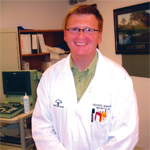Changes can be tough for patients to accept. Dr. Murphy feels you can have a higher success rate if you create a team feeling. He likes to explain to the patient why a strategy is necessary—not be the doctor who just orders and expects to be followed. “They have more of a chance to follow [a treatment plan] if you take the time to explain it in a way that they can really understand,” he says. “What’s the use of a great strategy if it’s never taken to heart by the patient?”
The clinical trials have given him a strong balance that he says keeps the day fresh. “The trials are phenomenal,” he says. “We’ve been a part of so many—from B cell to JAK-STAT pathways,” he says. “We do all phases—Phase I through Phase IV. It definitely keeps it interesting to look at the mechanism of action for different molecules.”
But as much as anything, rheumatology enthuses him because he finds it to be an area of medicine more likely to have positive results. “I think I had a very open mind in medical school, and when I did my rheumatology rotation, it seemed patients so often were getting better with treatment. … That’s something that can make you feel good at the end of the day.”
Drinking It In
Dr. Murphy gets a break from the rheumatology routine by creating beverages of choice for consumers. Choosing the ingredients he wants to use and working with the beverage house—the very one used for Arizona Iced Tea—can take quite a bit of fine-tuning, but it’s all a part of trying to make the drink a palate pleaser. Dr. Murphy says, “Hey, we have to titrate medication in rheumatology, don’t we?”
His latest drink, called Formula 5, is so named, he says, because it tries to fulfill five requirements: hydration, antioxidants, vitamins, electrolytes and nutrients. And Dr. Murphy says he has other potential drinks in mind.
“I would actually love to create a drink that would help people’s arthritis,” he says, “maybe somehow incorporate antiinflammatory properties.”
Eric Butterman is a Texas-based freelance writer. Contact him via e-mail at [email protected].
Career Highlights

Dr. Murphy
Fred Murphy, DO, FACP, FACR, received his medical degree from the Philadelphia College of Osteopathic Medicine. He completed his Internal Medicine residency and Rheumatology Fellowship training at the Walter Reed Army Medical Center and served as chief of rheumatology at Brook Army Medical Center in San Antonio, Texas, prior to joining AAOC/ACCR.



